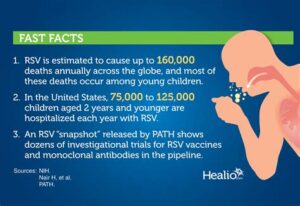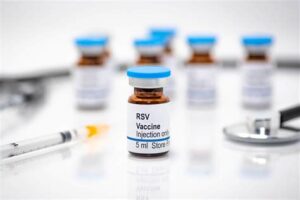Discover essential information about the RSV vaccine, its compatibility with other vaccines, and expert recommendations for safe simultaneous vaccinations.As the world continues to prioritize public health, many people are curious about the RSV vaccine and its compatibility with other immunizations. Respiratory syncytial virus (RSV) poses significant health risks, especially for infants and the elderly, making the availability of an effective vaccine a vital breakthrough. However, with the myriad of vaccinations available today, many individuals wonder: Can they receive the RSV vaccine alongside their other vaccines? This post will delve into the basics of the RSV vaccine, explore its compatibility with other shots, and discuss the potential impact of receiving multiple vaccines at once. Additionally, we’ll provide important considerations for those contemplating simultaneous vaccinations and share expert recommendations to help you make informed decisions about your health. Join us as we navigate this crucial topic in modern medicine.
RSV vaccine basics
The Respiratory Syncytial Virus (RSV) vaccine is designed to protect individuals from RSV infections, a leading cause of respiratory illnesses in infants and young children. The vaccine works by simulating an immune response that allows the body to recognize and fight off the actual virus if exposed in the future.
The vaccine is particularly important for vulnerable populations, including premature infants, children with congenital heart or lung conditions, and older adults who may experience severe complications from RSV. In recent years, advancements in vaccine technology have led to the development of safer and more effective RSV vaccines.
Currently, there are various types of RSV vaccines under development, with ongoing clinical trials to determine their efficacy and safety profiles. The ultimate goal of these vaccines is to reduce the burden of RSV-related hospitalizations and improve health outcomes in affected populations.
Compatibility of RSV vaccine with others
The RSV vaccine is designed to protect against the respiratory syncytial virus, which can cause severe respiratory illnesses, particularly in young children and older adults. One common question among healthcare providers and patients is whether the RSV vaccine can be given alongside other vaccines.
Current research indicates that the RSV vaccine is generally considered safe to administer in conjunction with various other vaccines. This is particularly important for maintaining comprehensive immunization schedules, especially during the peak respiratory infection season. When planning vaccinations, it is crucial to consult with healthcare professionals to evaluate individual health conditions and vaccination histories.
Additionally, studies have shown that receiving the RSV vaccine along with other vaccines does not compromise the immune response. In fact, the body is capable of generating an effective immune response to multiple vaccines when administered together. However, there may be specific recommendations based on age, underlying health issues, or local guidelines that should always be followed.
| Vaccine Type | Compatibility with RSV Vaccine |
|---|---|
| Influenza | Compatible |
| Pneumococcal | Compatible |
| MMR (Measles, Mumps, Rubella) | Compatible |
Impact of getting RSV vaccine with other vaccines
Receiving the RSV vaccine alongside other vaccines can raise important questions about safety and efficacy. Research indicates that administering the RSV vaccine in conjunction with other vaccines generally has a positive outcome. However, it’s essential to understand how multiple vaccinations may work together within the immune system.
Studies show that getting the RSV vaccine concurrently with other vaccines does not lead to adverse reactions more frequently than receiving them separately. For instance, when the RSV vaccine is given along with the influenza vaccine, both immune responses remain robust. This is crucial for populations susceptible to respiratory illnesses, as it can enhance community immunity and protect individuals from multiple viruses simultaneously.
Moreover, health authorities often emphasize the importance of staying up-to-date with vaccinations, especially for vulnerable groups such as infants and the elderly. It is advisable to speak with a healthcare provider regarding the timing and compatibility of the RSV vaccine with other vaccinations, particularly during high-risk pandemic periods. A coordinated vaccination plan c
Considerations for receiving multiple vaccines
When receiving the RSV vaccine, it is essential to consider various factors related to multiple vaccinations. Understanding how different vaccines interact can help ensure both safety and efficacy. Consulting with a healthcare provider is crucial as they can offer personalized advice based on age, medical history, and current health conditions.
One key consideration is the timing of the vaccines. While some vaccines can be administered simultaneously, others may require specific intervals between doses. It is important to avoid an overlap that might lead to reduced immunity or increase side effects. It is also important to consult vaccine schedules provided by health authorities to understand the recommended intervals.
Another factor to contemplate is potential side effects. When receiving multiple vaccines, there may be an increase in mild side effects such as soreness at the injection site, fatigue, or low-grade fever. Being aware of these possibilities can help individuals manage their responses following vaccination.
Expert recommendations on simultaneous vaccinations
When considering the administration of multiple vaccines, including the RSV vaccine, it’s essential to rely on expert recommendations to ensure safety and effectiveness. Experts in the field typically advocate for the simultaneous administration of vaccines whenever possible, as this can help improve vaccination rates and reduce the number of healthcare visits for individuals.
According to the Centers for Disease Control and Prevention (CDC) and other health organizations, several factors are taken into account when determining the appropriateness of receiving the RSV vaccine alongside other vaccines. These factors include age, medical history, and potential interactions between vaccines. The general guideline is to consult with a healthcare provider who can assess individual circumstances and provide tailored advice.
Experts emphasize that the benefits of receiving multiple vaccines concurrent with the RSV vaccine often outweigh the risks. This approach helps in developing broader immunity while minimizing discomfort and possible side effects associated with multiple injections. Always schedule a discussion with a healthcare professional who can guide you through your vaccination options and ensure that you abide by the latest health recommendations.
Frequently Asked Questions
What is RSV and why is it significant?
RSV, or Respiratory Syncytial Virus, is a common virus that causes respiratory infections, particularly in young children and older adults. It’s significant because it can lead to serious health complications, especially in vulnerable populations.
Can the RSV vaccine be administered alongside other vaccines?
Yes, the RSV vaccine can generally be given alongside other vaccines. However, it’s important to consult with a healthcare provider for personalized advice.
What are the common vaccines that can be given with the RSV vaccine?
Common vaccines that may be administered with the RSV vaccine include the influenza vaccine, pneumococcal vaccine, and vaccines for other respiratory diseases.
Are there any specific timelines or recommendations for receiving the RSV vaccine?
Timing for the RSV vaccine may vary based on individual health conditions and vaccination schedules. Healthcare providers will offer specific recommendations according to the patient’s age and health status.
What side effects are associated with the RSV vaccine?
Side effects of the RSV vaccine may include mild soreness at the injection site, fever, or fatigue. Serious side effects are rare, but it’s important to monitor for any unusual symptoms after vaccination.
Is the RSV vaccine suitable for everyone?
While the RSV vaccine is designed for high-risk populations, such as infants and older adults, it’s not necessarily suitable for everyone. Individuals should consult their healthcare provider to determine their eligibility.
How effective is the RSV vaccine compared to other vaccines?
The effectiveness of the RSV vaccine is still being studied, but it is designed to significantly reduce the incidence of severe respiratory illness caused by RSV, similar to how other vaccines protect against their target diseases.





